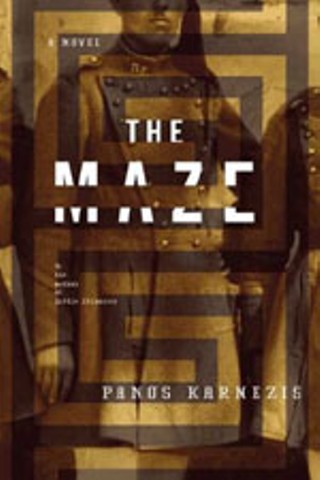Book Review: Readings
Panos Karnezis
Reviewed by Roger Gathman, Fri., March 26, 2004

The Maze
by Panos KarnezisFarrar, Straus & Giroux, 376 pp., $24
One of the more sinister aftereffects of World War I was the British plot to dismember Turkey. Greek nationalists, dreaming of a greater Greece, were happy to operate as the British cat's-paw. The Greek army penetrated Asia Minor almost to Ankara, but were turned back by then Turkish commander and eventual head of state Gazi Mustafa Kemal. Kemal decisively routed the Greek troops, strung out on an impossibly long front in Anatolia, in August, 1922. The Turks pressed them rapidly back to the sea at Smyrna, where they were evacuated. From their boats, they could see Smyrna going up in flames. One and a half million Greeks in Asia Minor were "exchanged" for 400,000 Turks in Greece in the next couple of years.
The reader of this novel is advised to keep that background in mind. Karnezis' ingenious, although ambiguous, framing device consists of repressing any sight or sound of the Turkish enemy as he describes the abbreviated anabasis of one Greek brigade in the Anatolian hinterlands. This is ingenious because it lends an end-of-the-world isolation to the troop's tactical difficulty; it is ambiguous because it colludes, however, obliquely, with the nationalistic Greek fantasy that Asia Minor doesn't, somehow, belong to the Turks, who (in terms of this fantasy) occupy the land as an ephemeral host.
Brigadier Nestor, the commander, has a number of problems at the beginning of Karnezis' second book. He is addicted to morphia; he is dogged by subversive handbills, which are being printed by someone in his brigade; his wine and cigars have been pilfered, perhaps by the same anonymous subversive; his company padre, Father Simeon, seems to be slightly lunatic; he misses his late wife; and he keeps having flashbacks of the massacre of a village that he ordered earlier in the war.
Some of these problems are sorted out in the book. By following the trail of shit left by an escaping horse, the brigade discovers a village where the town worthies are Greek, or sympathetic to the Greeks; by discovering who set the horse free, he finds his subversive; and through a devil's bargain with a traveling journalist, he finds the means to redeem his military reputation – although the end leaves that potential, and fraudulent, redemption up in the air.
Karnezis has a penchant for clunky comparisons and likenesses: "He crumbled up the paper into a ball and tossed it away defiantly; the paper grenade did not explode – it rolled under his cot." You expected it to explode, maybe? His real talent is for eerie images on a larger scale. For instance, after Nestor orders a firing squad to execute two people in the town, "the earthen streets of the town, the yards, the common and the gardens all turned a radiant red." This is an elegant visible correlate of a deeper, unspoken panic that seizes the townspeople as they realize that their way of life is over.










